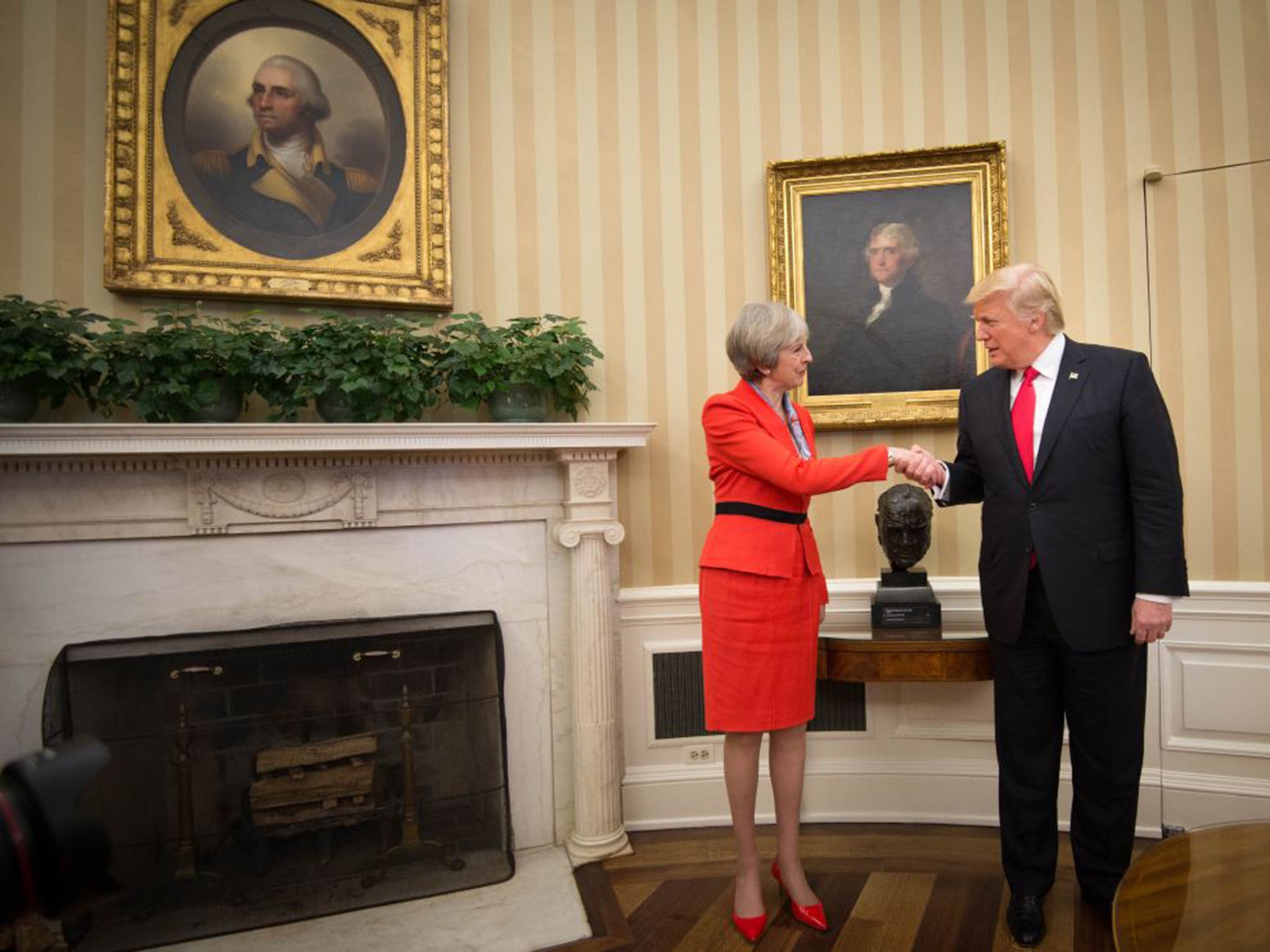None of the US papers put Theresa May's visit to the White House on their front page. It's time to face our insignificance
While the British newspapers didn't hesitate to lead with the Prime Minister's first meeting with President Trump, for the American audience it didn't seem particularly relevant


Your support helps us to tell the story
From reproductive rights to climate change to Big Tech, The Independent is on the ground when the story is developing. Whether it's investigating the financials of Elon Musk's pro-Trump PAC or producing our latest documentary, 'The A Word', which shines a light on the American women fighting for reproductive rights, we know how important it is to parse out the facts from the messaging.
At such a critical moment in US history, we need reporters on the ground. Your donation allows us to keep sending journalists to speak to both sides of the story.
The Independent is trusted by Americans across the entire political spectrum. And unlike many other quality news outlets, we choose not to lock Americans out of our reporting and analysis with paywalls. We believe quality journalism should be available to everyone, paid for by those who can afford it.
Your support makes all the difference.Yesterday the British Prime Minister Theresa May visited the new President of the United States. This follows her speech at a Republican congressional conference in Philadelphia on Thursday, in which she congratulated the new president on his victory and vision for the country while reiterating the importance of our shared institutions, from the World Bank to Nato.
The theme of the speech was essentially that despite Trump’s protectionist and isolationist instincts – those which May correctly linked to Brexit – we are, as Hillary Clinton reminded us, better together.
If you looked at the British broadsheets and broadcasters, this was a seminal moment: a fledgling Prime Minister, not even a year into her premiership, guiding an inexperienced president in his administration’s infancy away from the Russian bear and back towards the home fires of the West. It was the Telegraph’s top story, below what I’m sure was a purely coincidental story about Thatcher and Reagan. The Guardian was a bit more circumspect, quoting May saying that she hopes the old adage "opposites attract" applies to her and Trump. It was the Times, though, that really summed up the theme of May’s speech, above a photo of her gesturing before an American flag: “Let’s stand together and halt the eclipse of the West.”
Here in America, a foreign head of government was on the majority of our front pages, but it wasn’t Theresa May. Instead, Mexico’s president Enrique Pena Nieto, was pictured on the front page of the New York Times, which didn’t even mention May above or below the fold. Pena Nieto was also on the cover of the Washington Post, again without a single reference to May’s visit. The Chicago Tribune featured the Mexican-American conflict as its headline, with May excluded from the front page again. But perhaps most shockingly, it got only the briefest mention – in a sidebar – on the front page of venerable conservative-leaning business paper the Wall Street Journal.
Even with British journalists on US television, she wasn’t the primary story: the BBC’s Katty Kay joined MSNBC’s breakfast programme Morning Joe, where May’s visit got only the briefest mention in the third hour. In the nine o’clock hour, former MP Louise Mensch joined MSNBC, where again May’s visit was not a primary talking point.
The networks did carry the press conference live, and the Prime Minister received praise for her performance. NBC’s Chuck Todd said she "had the agenda,” and that “she handled this very well” considering it could “go sour quickly if the personal relationship doesn’t work”.
It wasn’t just the media that diminished the Prime Minister’s standing, though. Trump displayed a show of dominance at worst and disinterest at best, coumpounding the brevity of the press conference by calling the Prime Minister by her first name rather than “Prime Minister” or even “Mrs May,” and reminding her that “you never know which way it’ll go” whether he likes someone or not.
As the Prime Minister seeks the limelight to reassert Britain as a global power player, the American media and even the American president have made clear exactly where they put her in the hierarchy of newsworthy events, and it’s nowhere near the top. Regardless of how she spins it at home, it doesn’t bode well for her chances of success in the United States.
Theresa May came to America with two primary goals: to counter the devil Putin by being the angel on Trump’s other shoulder, and desperately try to bring home the bacon in the form of a trade deal that will alleviate concerns that Brexit will wreck the economy. Media coverage alone is unlikely to derail either of these, but given the character of the new president, it’s an important component in deciding just how seriously she is taken by this administration.
Mrs May, while doing well enough at the press conference, hasn’t inspired the level of interest here that even Nigel Farage has. Her visit will quickly be forgotten by both the president and the American people. This is a setback, because the Prime Minister will need sustained media interest and US popularity in order to convince Trump, who is an avowed protectionist but also obsessed with ratings and press coverage, that a free trade deal is a good idea. If “the shows,” as Trump calls them, aren’t talking it up – and they’re not – it’s unlikely to become a priority. For a man who rails against the press, he desperately seeks their approval. As his own advisors have discovered, being on television is often the only way to get his attention. Mrs May was not on television very much today.
What happens next is anyone’s guess. Both Brexit and the Trump administration are proving unpredictable. But the Prime Minister, while by all means completing a flawless diplomatic visit, didn’t capture the lightning in the bottle needed to impress and influence Trump. That doesn’t mean she can’t, but to do so she’s going to need the American media not only on her side, but as her champion. As of now, that’s far from happening.
Join our commenting forum
Join thought-provoking conversations, follow other Independent readers and see their replies
Comments